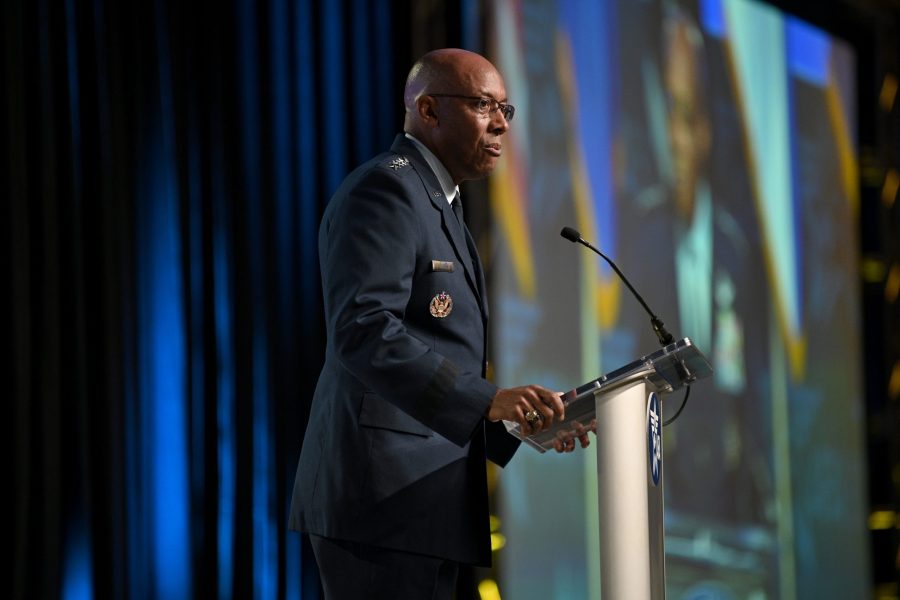The Senate confirmed Air Force Gen. Charles Q. Brown Jr. as the next Chairman of the Joint Chiefs of Staff on Sept. 20, clearing the way for Brown to become the first Airman to serve as the nation’s top military officer in 19 years.
Brown was approved in a bipartisan 83-11 vote as lawmakers circumvented the legislative hold of Sen. Tommy Tuberville (R-Ala.), just a few days before the term of the current Chairman, Army Gen. Mark A. Milley, was set to end.
It is not immediately clear if Brown will be sworn in to his new position before Oct. 1, when Milley’s term expires.
Also poised for roll-call votes in the coming days are Gen. Randy George to be the next Chief of Staff of the Army and Gen. Eric Smith to be the next Commandant of the Marine Corps.
For months, hundreds of general and flag officer nominations have been stuck in the Senate. Tuberville’s hold prevented them from being approved all at once by voice vote, while Senate Democrats resisted calling up nominees for individual votes.
Tuberville (R-Ala.) placed his hold to protest a Pentagon policy to provide paid leave and travel funds for troops requiring reproductive services, including abortions, who are based in states where those services are not available. The Republican said he would be willing to vote on nominees individually, but Democrats argued doing so would take up too much floor time and encourage more blockades in the future.
On Sept. 20, Senate Majority Leader Sen. Chuck Schumer (D-N.Y.) reversed course and announced he would bring up Brown, George, and Smith for individual votes after Tuberville indicated he would try to bring up Smith’s nomination for a vote himself in an unusual procedural motion. Schumer accelerated the Senate’s lengthy legislative process to file cloture and vote on Brown in one day, and Tuberville did not object.
Tuberville did, however, vote against Brown’s confirmation, as did 10 other Republicans—an unusual occurrence. Nominees to be Chairman have traditionally been confirmed quickly and unanimously by voice vote, though Milley was approved by a 89-1 roll-call vote.
Brown’s confirmation ensures the Chairman job will not be filled on an acting basis, something that has only happened once before in 1993. The Army, Navy, and Marine Corps have all been without a Senate-confirmed leader for several weeks.
It remains to be seen if or when the Senate will hold an individual roll-call vote on Gen. David W. Allvin, who has been nominated to succeed Brown as Air Force Chief of Staff. Should lawmakers not do so before Brown is sworn in as Chairman, Allvin will become acting Chief of Staff in addition to his current job as Vice Chief of Staff.
If Allvin is confirmed, his job as Vice Chief would be filled on an acting basis by the most senior officer on the Air Staff until his nominated successor, Lt. Gen. James C. “Jim” Slife, is confirmed.
More than 100 Air Force and Space Force general officer nominations are still awaiting confirmation.
Still, Brown’s ascension to Chairman marks a milestone for the Air Force, which has not had a general in the position since Gen. Richard Myers retired in 2005. All told, he is the fifth Airman to be Chairman.
A career fighter pilot with most of his experience in the F-16, Brown has 3,000 hours of flying experience, including 130 combat hours. Brown, the son and grandson of veterans, has command experience in the Middle East, Europe, and, perhaps most importantly, the Indo-Pacific. Prior to becoming Chief of Staff, Brown was the commander of Pacific Air Forces.
Introducing Brown as his selection for Chairman back in May, President Joe Biden called him a “a proud, butt-kicking American Airman.”
“Gen. Brown is a warrior descended from a proud line of warriors,” Biden added. “He knows what it means to be in the thick of battle and how to keep your cool when things get hard.”
